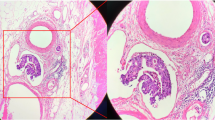Abstract
Background
“Skip” lymphovascular invasion presenting as discontinuous foci of tumor cells within the colon wall is now excluded from consideration when determining T stage in the TNM classification. The purpose of this study was to assess the clinicopathological characteristics of colorectal cancer (CRC) patients with such skip lymphovascular invasion.
Methods
First, a retrospective questionnaire survey of the incidence of skip lymphovascular invasion was performed for a total of 1,868 patients with CRCs at ten institutions. Next, we comparatively assessed clinicopathological data for 896 CRC patients with or without skip lymphovascular invasion.
Results
The incidence of skip lymphovascular invasion was 1.1 % (20 out of 1,868). Most of the affected cases were rectal, pT2, and node negative, with moderately differentiated histology. Skip lymphovascular invasion was present in the muscularis propria and subserosa, with the tumors directly invading submucosa (pT1) or muscularis propria (pT2). Hepatic metastasis was greater in CRC with skip lymphovascular invasion (25 %) than in pT1/2 CRC (0 %; P < 0.001) or pT3 CRC without such invasion (13.8 %; P = 0.185).
Conclusions
Our study suggests that skip lymphovascular invasion is associated with hepatic metastasis in CRC cases. Thus, definition of a T category including such invasion would be useful for clinical practice.


Similar content being viewed by others
References
Center MM, Jemal A, Smith RA et al (2009) Worldwide variations in colorectal cancer. CA Cancer J Clin 59:366–378
Watanabe T, Itabashi M, Shimada Y et al (2012) Japanese Society for Cancer of the Colon and Rectum (JSCCR) guidelines 2010 for the treatment of colorectal cancer. Int J Clin Oncol 17:1–29
Sobin LH, Gospodarowitz MK, Wittekind C (2009) TNM classification of malignant tumours, 7th edn. Wiley-Liss, New York
Minsky BD, Mies C, Rich TA et al (1989) Lymphatic vessel invasion is an independent prognostic factor for survival in colorectal cancer. Int J Radiat Oncol Biol Phys 17:311–318
Gertler R, Rosenberg R, Schuster T et al (2009) Defining a high-risk subgroup with colon cancer stages I and II for possible adjuvant therapy. Eur J Cancer 45:2992–2999
Shirouzu K, Isomoto H, Kakegawa T et al (1991) A prospective clinicopathologic study of venous invasion in colorectal cancer. Am J Surg 162:216–222
Mitomi H, Mori A, Kazazawa H et al (2005) Venous invasion and down regulation of p21WAF1/CIP1 are associated with metastasis in colorectal carcinomas. Hepatogastroenterology 52:1421–1426
Roxburgh CS, McMillan DC, Richards CH et al (2014) The clinical utility of the combination of T stage and venous invasion to predict survival in patients undergoing surgery for colorectal cancer. Ann Surg 259:1156–1165
Ueno H, Mochizuki H, Hashiguchi Y et al (2007) Extramural cancer deposits without nodal structure in colorectal cancer: optimal categorization for prognostic staging. Am J Clin Pathol 127:287–294
Qiu HB, Chen G, Keshari RP et al (2011) The extramural metastasis might be categorized in lymph node staging for colorectal cancer. BMC Cancer 11:414
Liebig C, Ayala G, Wilks J et al (2009) Perineural invasion is an independent predictor of outcome in colorectal cancer. J Clin Oncol 27:5131–5137
Ueno H, Shirouzu K, Eishi Y et al (2013) Characterization of perineural invasion as a component of colorectal cancer staging. Am J Surg Pathol 37:1542–1549
Washington MK, Berlin J, Branton P et al (2009) Protocol for the examination of specimens from patients with primary carcinoma of the colon and rectum. Arch Pathol Lab Med 133:1539–1551
Lim SB, Yu CS, Jang SJ et al (2010) Prognostic significance of lymphovascular invasion in sporadic colorectal cancer. Dis Colon Rectum 53:377–384
Harris EI, Lewin DN, Wang HL et al (2008) Lymphovascular invasion in colorectal cancer: an interobserver variability study. Am J Surg Pathol 32:1816–1821
Compton CC, Fielding LP, Burgart LJ et al (2000) Prognostic factors in colorectal cancer. College of American Pathologists Consensus Statement 1999. Arch Pathol Lab Med 124:979–994
Jessup JM, Stewart A, Greene FL et al (2005) Adjuvant chemotherapy for stage III colon cancer: implications of race/ethnicity, age, and differentiation. JAMA 294:2703–2711
Quasar Collaborative Group (2007) Adjuvant chemotherapy versus observation in patients with colorectal cancer: a randomized study. Lancet 370:2020–2029
Tanaka S, Oka S, Chayama K (2008) Colorectal endoscopic submucosal dissection: present status and future perspective, including its differentiation from endoscopic mucosal resection. J Gastroenterol 43:641–651
Kitajima K, Fujimori T, Fujii S et al (2004) Correlations between lymph node metastasis and depth of submucosal invasion in submucosal invasive colorectal carcinoma: a Japanese collaborative study. J Gastroenterol 39:534–543
Acknowledgments
For kindly supplying the data the authors greatly thank: Hideki Ueno, Department of Surgery, National Defense Medical College; Gen Watanabe, Division of Molecular and Diagnostic Pathology, Niigata University Graduate School of Medical and Dental Sciences; Tetsuro Higuchi, Department of Digestive Surgery, Graduate School, Tokyo Medical and Dental University; Keiji Matsuda, Department of Surgery, Teikyo University; Hiroshi Kashida, Department of Gastroenterology and Hepatology, Kinki University; Shiro Oka, Department of Endoscopy, Hiroshima University Hospital; Tomio Arai, Department of Pathology, Tokyo Metropolitan Geriatric Hospital; Masamitsu Unakami, Department of Pathology, Watari Hospital; Ryo Wada, Department of Pathology, Juntendo Shizuoka Hospital, Juntendo University School of Medicine; Hisashi Nakamura, Department of Gastroenterology and Endoscopy, Chofu Surgical Clinic; Akinori Iwashita, Department of Pathology, Fukuoka University; Tomoo Ito, Department of Pathology, Kobe University Graduate School of Medicine; Atsushi Ochiai, Pathology Division, Research Center for Innovative Oncology, National Cancer Center Hospital East; Yasuo Ohkura, Department of Pathology, Kyorin University; Tadayoshi Kakemura, Division of Gastroenterology, Department of Internal Medicine, Toho University Ohashi Medical Center; Hiroshi Kijima, Department of Pathology and Bioscience, Hirosaki University Graduate School of Medicine; Ryoji Kushima, Division of Molecular and Diagnostic Pathology, Shiga University of Medical Science Hospital; Kazutomo Togashi, Department of Gastroenterology, Fukushima Medical University; Takashi Nishigami, Department of Pathology, Steel Memorial Hirohata Hospital and Tamotsu Sugai, Department of Molecular Diagnostic Pathology, Iwate Medical University School of Medicine.
Conflict of interest
The authors declare no conflict of interest.
Author information
Authors and Affiliations
Consortia
Corresponding author
About this article
Cite this article
Okamoto, Y., Mitomi, H., Ichikawa, K. et al. Effect of skip lymphovascular invasion on hepatic metastasis in colorectal carcinomas. Int J Clin Oncol 20, 761–766 (2015). https://doi.org/10.1007/s10147-014-0778-z
Received:
Accepted:
Published:
Issue Date:
DOI: https://doi.org/10.1007/s10147-014-0778-z




